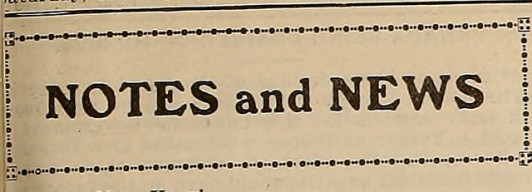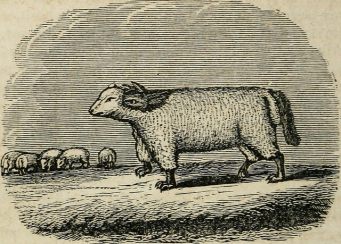
Historians love archives. Archives are collections of unique materials available only at the archive and so when you visit one, you get your hands on materials that you cannot get anywhere else. Sure, some archives are moving to put their materials online. If you are one of the towering intellectual figures of the twentieth century or if you won the Nobel Prize single-handedly twice, your papers are online and accessible by anyone with an internet connection. But that process is expensive and most archival material is stored in boxes just waiting for researchers to come visit.
Those boxes can contain all kinds of things: diaries, notes, drafts of books, correspondence, pretty much whatever the person donated for preservation can be in there. And historians get to go through it all. Vern Jensen, a professor I knew at the University of Minnesota, called it, “reading other people’s mail and calling it ‘work.'”
A couple weeks ago, I got to visit the Library of Virginia, a really beautiful facility in Richmond. I was there to visit the records of the Virginia Commission on Constitutional Government (VCCG). For its short life (1958-1969) the VCCG was headed by David J. Mays, and was dedicated to “develop and promulgate information concerning the dual system of government, federal and state, established under the Constitution of the United States.” If that sounds dull, then you need to remember that this was code for: “Virginia does not want to recognize the authority of the Federal government to enforce the Fourteenth Amendment and make us desegregate our schools.” Conservatives were all about “states’ rights” and tried mightily to deflect the fact that those “rights” were almost exclusively invoked to deny African Americans their rights. William F. Buckley was a master at the strategy. I think we can learn two things from these records.

First, whose voices are important and why?
We are getting a lot of advice recently about how to contact your Congresscritters and you should definitely be giving them a call to let them know how you feel about the important issues of the day. Indivisible, a group of former Congressional staffers offers realistic advice about what motivates your own Congresscritter. It is all about the votes; if you are one of the Congresscritter’s constituents, your voice counts for more. If you call directly, your voice counts for more. As the kids say today, “duh.” (Do the kids still say that today?)
If we think about why our political system is arranged as it is, we can get some insight into why some voices count more than others. On the one hand, representative democracy is based on the idea we are all in this together. Our representatives come from our geographic area because the idea is that they share interests with us and will act on our best interests because our interests are also their best interests. That is the ideal, anyway. Hence, if you are outside the community represented your voice counts for less than those inside the community. Your voice is trusted precisely because you are a member of the community.
On the other hand, consider our legal system where the system is the exact opposite of politics. If you are a voter (and I hope you are) you’ve probably been called for jury duty. In the courtroom, if you know the parties involved in the case, you cannot serve on the jury. In the courtroom, the participants are credible if they are not connected to the parties of the case. The jury is trusted precisely because jurors do not have a stake in the outcome of the case.
White southerners defending segregation tried to play on both sides of this game. On the one hand, they consistently claimed that African American demands for civil rights were the result of “outside agitation” and that northerners were coming down to Dixie to stir up trouble. You can pick almost any issue of the segregationist newspaper The Citizen to find this argument. So, those outside the community should not be heard because they had no stake in the fight, according to this line of argument.
On the other hand, any northerner who embraced segregation was seized on as proof of their unbiased stance. They should be trusted because they were unbiased and impartial. You see this line of argument in the VCCG materials, although it is not obvious at first. The VCCG published and distributed a lot of material. Here’s a sample of their work. If you look at any of their publications, you’ll notice that the only author listed is the Commission itself. There is no individual author listed on any of their publications. This is by design. Mays originally wanted all the works distributed by the VCCG to be written by “northerners.” This was meant to insulate the work from charges of a southern bias. It is an interesting idea, since a common charge southern whites made against northern criticism was that northerners had no idea what race relations were like in the south and so should just butt out. It appears, however, there weren’t enough northern authors to fill out the catalog so the VCCG just stripped authorship of all the pieces and published them as products of the VCCG. By posing as impartial observers of the current scene they hoped to mask their interests in continuing racial segregation.

The second thing we can learn from the VCCG records is that there is usually at least one wolf in sheep’s clothing.
The boundary between the “respectable right” and “racist right” must be constantly patrolled. For example, the young Steve Miller (no relation) apparently threw a “white power” sign in a photograph (Snopes isn’t so sure). The reason there is even a debate about this is that Miller has a past that suggests he’s deeply interested in advancing white supremacy. So, we are left to wonder, is Miller an admirer of white supremacists? Or just admired by them? Where do we draw this line between “respectable” and “racist?” Should we even bother?
Going back to the VCCG, in some cases, it is pretty easy to tell who wrote the pieces because they are simply reprints of previously published pieces. An example is an essay, “Equality versus Liberty” by Georgia attorney R. Carter Pittman. I’ve written about Pittman before (to get the whole story, you should buy my book!!). Pittman was firmly convinced of the inferiority of African Americans. One of the documents in the VCCG papers is an article about Pittman that had been entered into the Congressional Record. Pittman explained in the article that there was a “rational basis” to discrimination. What kept “Negroes” from learning was “something that lies within them….It’s unfortunate, but it’s inherent… It isn’t a question of supremacy. There’s a certain quality people have, just like cattle, and when they have so many of a certain type of qualities, you group them.” Pittman was a member of the notoriously antisemitic Liberty Lobby in the 1960s. And, his work was published by the taxpayers of the Commonwealth of Virginia. In a plug for my profession (and my school!) historian Lester Cappon of the College of William and Mary wrote to Mays that:
“In characteristic Pittman fashion it abounds in literalism, unhistorical statements, non sequiturs, and far-fetched conclusions, in his arguments on behalf of constitutional government which amount, in considerable part, to a thinly veiled support of racism… It is objectionable, I think, that Mr. Pittman’s polemics, under the guise of historical presentation, should be circulated by the Virginia Commission on Constitutional Government.” (Cappon to Mays, 13 December 1960)
We seem to have returned to those days when outright racists are grabbing the levers of power. We’ve fought this battle before and it looks like we will have to fight it again. It is best that we learn from the past in order to win it more fully this time around.

This work is licensed under a Creative Commons Attribution-NonCommercial-ShareAlike 4.0 International License.

Pingback: Was James Buchanan a Racist? Libertarians and Historical Research | Fardels Bear
Pingback: Nancy MacLean’s Segregationist Sins of Omission…and Commission | NewZSentinel